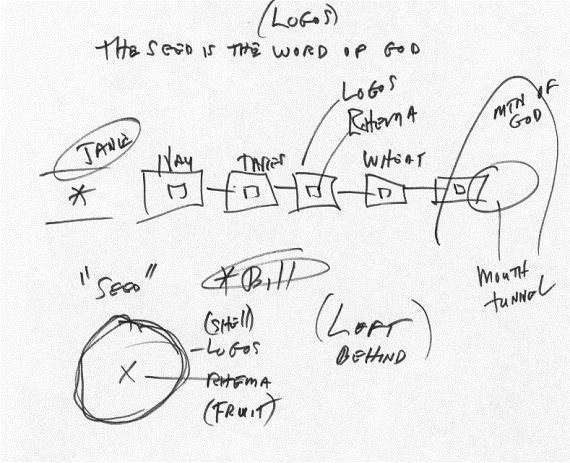ALL ABOUT YOU: GIDEON, CHAPTER 17
PARABLES
Scroll Down Or Click Here For Diagram
02-08-04
A synopsis of the previous chapter entitled “Introduction to tongues”: The Bible, which is the tongue of the Lord, declares that God speaks to us “twice” (Job 33:14), or in two ways which we discern to be through His logos word and through His rhema word; through the visible logos and through the invisible rhema; through our soul (conscious - Bible) and through our spirit (subconscious – “dream” Job 33:15). Both these modes of communication are purposed by God to impact the born-again hearer with understanding. Speaking is the mode; understanding is the goal. The spiritual emphasis of “tongues” is not the speaking, but the understanding. The focus of the tongue is targeted upon the recipient’s understanding (receiving) “the hidden manna” (Rev 2:17). Our understanding is accomplished through/by the instantaneous interpretation or conversion of the incoming tongue by the indwelling Holy Spirit (John 16:13; 1 John 2:27) of the word-sounds of the tongue as they enter the ear gate. This kind of tongue is defined in the Greek text as “glossa” (Acts 2:3). Glossa will be received only by born-again hearers, and then as if it had been spoken in their own respective native language; because, the tongue has instantly, prior to perception, been converted into each born-again hearer’s own culturally learned symbols, sounds, and associations by the Holy Spirit.
PARABLES
(Mat 13:36) Then Jesus sent the multitude away, and went into the house [a covering – as in the pod of a seed]: and his disciples [learners, pupils (i.e. students)] came unto him, saying, Declare unto us [through the idea of defining; to indicate, spec. to expound (Dict: to explain; interpret)] the parable of the tares of the field.
A parable in the Bible is also a tongue. What? Well isn’t a parable in the Bible an utterance of God? If so, then it is indeed the tongue of the Lord. A parable is a kind of tongue which falls comfortably into the specific category of “divers kinds of tongues” (1 Cor 12:10), the single category of the gifts wherein all tongues fall. Parables are a kind of tongue manifested by Jesus to all people in the visible form and outward appearance of familiar word-vessels, the meanings of which the unsaved hearers think that they fully understand because they recognize (by sight) the word-vessels; whereas they are actually in possession of a partial understanding, and that in the logos dimension of reality. The unsaved hearers are in fact in possession of only the outward temporal superficial understanding, which is the seed pod or covering, and not the manna nourishment abiding within that seed pod. “And he would fain have filled his belly with the husks that the swine did eat:” (Luke 15:16). One characteristic that all “kinds” of tongues have in common is that God has purposed the manna to be hidden, or covered.
Amen
